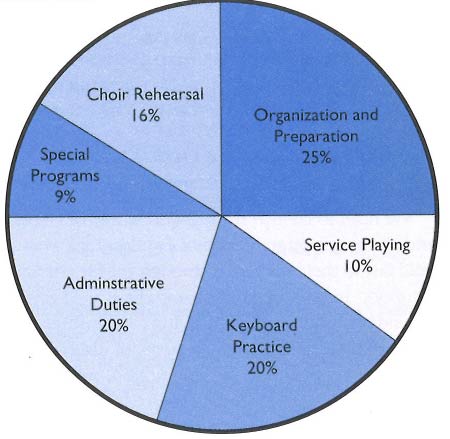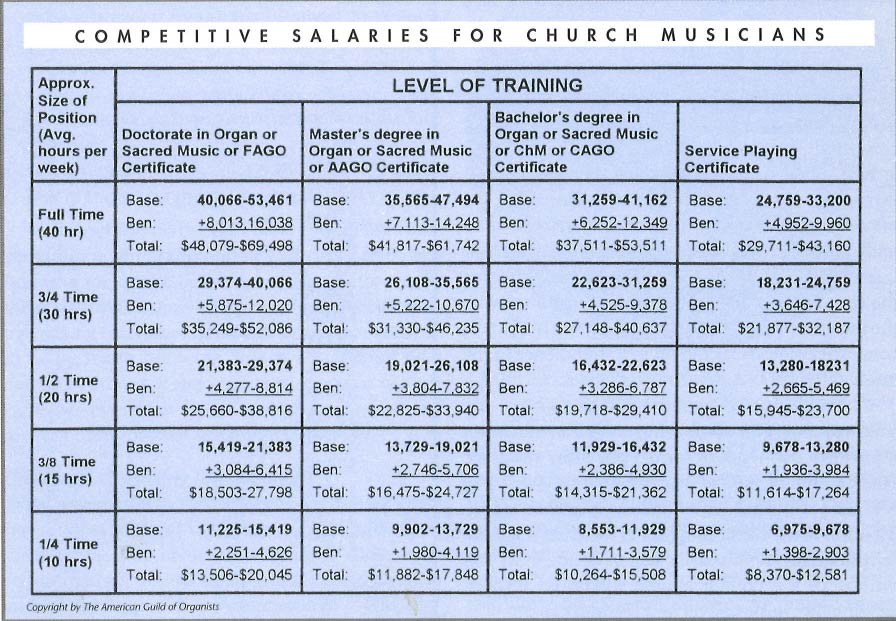At the end of a typical week a church musician may have served in any number of complicated and varied roles: counselor, teacher, guide, disciplinarian, stage director, consultant, financial planner, worship leader, accompanist, program director, rock musician, classical musician, researcher, biblical interpreter, babysitter, set-up crew, cleanup crew, and more. Was it worth it? If the congregation was led to a more inspired worship of God, then yes, it was worth it. Can it be done again next week? Next month? Next year? That depends.
In its present state of flux and even rebirth, church music stands at a fragile juncture, and those who lead congregations in musical praise are increasingly becoming the victims of burnout or disappointment. Four quotes from a recent survey of church musicians in the Grand Rapids, Michigan, area serve to point out some common concerns:
- "Demand for a variety of music styles has increased greatly, along with higher expectations for the inclusion of more musicians as accompanists in worship. The extra preparation required (time and education) to accomplish this is not being acknowledged."
- "There is much more time involved in being a church musician than people realize or are willing to pay for."
- "I would like to see better compensation…We musicians work hard in preparing and leading worship."
- "I will soon be leaving this position. The stress and lack of respect for my needs have burned me out."
This emphasis on the mundane issue of fair compensation might at first appear to deflect a musician from the important task of serving as a minister of the gospel; in fact, however, preoccupation with simply making ends meet serves as a far greater deterrent to doing his or her work. Just as one cannot play baseball without a bat, a church musician cannot carry out his or her duties apart from an environment of both spiritual and financial nurture.
Creating a Nurturing Environment
An area musician who for years has been offering her services without compensation recently commented that she is afraid to ask for pay because she is "concerned about how this would affect my position and relationship with the congregation." This confession points out just how hurtful a poor environment can be for both musician and congregation. Ultimately, as a musician's energy and devotion dwindle, the quality of congregational worship is adversely affected.
As a first step in building a nurturing environment for a musician, a congregation should attempt to discern God's purpose for its musical ministry. Not every congregation will be able to offer a musician the compensation it might like to, but each congregation has a responsibility to develop an atmosphere of trust and mutual respect and appreciation between clergy, congregation, and musician. The church should set very clear goals for itself and for its musician. These should be laid out in a detailed job description, outlining exactly what the musician will and will not be expected to do.
In this process a church as a whole should recognize that a musician performs many of his or her duties throughout the week, away from the keyboard. The pie chart gives an idea of how a typical week for a keyboardist/organist/choir director might be divided:

Once a clear job description and goals have been set, a church should not require unreasonable extra duties from its musician. Each new service added, each new choir started, even each new instrument purchased may require a substantial time investment from a musician. This must be taken into account.
In addition, each musician should receive a job review at regular intervals. Those conducting the reviews should not only praise the musician for work well done and suggest changes for improvement, they should also listen attentively to all of the musician's concerns.
Efficient and informative staff meetings at regular intervals are also important for maintaining an open line of communication between all members of the staff. At such meetings, a musician can not only give advice on musical matters but can also offer suggestions on logistics, preparation time, and worship in general. Many musicians are creative and inspiring worship leaders; an open forum in which to express their ideas can be one of the joys of working in a church. In addition, staff meetings and job reviews will help to squelch inappropriate comments on the musician's performance (such as mutterings under the breath) that can only be harmful to the church as a whole.
Staff meetings and job reviews are important, but so is a written contract. No paid church musician should be without one. A contract offers a legal means of ensuring that the musician's work is carried out as agreed, and it indicates trust and goodwill between congregation and musician. It is the only way to be certain, for example, that neither side is unintentionally taking advantage of the other, or that the musician can justifiably take a sick day without feeling guilty or remiss in her duties. The contract is a tangible reminder of the bond of trust and the common goals that each person involved brings to the act of worship and praise.
Finally, church members should express their appreciation to the musician at regular intervals, no matter what the level of compensation offered by the church. Recognizing special accomplishments or an employment anniversary can go a long way towards feeding the future energy and commitment of a church musician; in fact, it can favorably affect the entire music program.
Compensating the Church Musician
Any musician who serves a church with faithful, competent, hard work deserves that church's stewardship; indeed, this stewardship is an important expression of the church's commitment to its own ministry. While many musicians may struggle internally to see themselves as professionals, very few question their commitment to their job. However, the church often fails to express its commitment to the musician and to the music program. That lack of commitment leads far too often to turbulence in the music program.
Of course, fair compensation is seldom an easy street to travel. Part of the difficulty is that much of a musician's real work is carried out away from the public forum of Sunday worship. So a good first step is to analyze the qualitative and the quantitative contribution of the music program to the church's entire ministry. Then it's an easier step to decide what percentage of the church budget should go towards funding the music budget and the musicians.
The accompanying salary chart (see below) provides a look at competitive salaries for a community like Grand Rapids, Michigan. These figures were established by the American Guild of Organists and deemed applicable to Grand Rapids after comparing the salaries of other professions with similar duties and educational requirements. When studying the chart, remember that a church musician's lack of formal education may often be offset by his or her experience; thus a musician with no degrees but with a proven record of successes should be compensated accordingly.
Benefits are another valuable means of compensation that are sometimes overlooked. In addition to health insurance, which is of obvious value, churches should consider offering others benefits, such as continuing education. The majority of musicians are eager to keep abreast of current trends in church music—they want to be exposed to the best worship experiences available. This often means attending conventions and workshops or joining professional organizations like the American Guild of Organists. When a church supports its musician by providing continuing education, it is making a sound investment in its own growth.
Keeping a Focus
Many churches are able to keep a music program afloat by dividing the leadership between several musicians. This is certainly understandable in cases such as using someone's special skills to direct a children's choir. However, the downside of this practice is that the music program loses focus, with each individual musician of necessity spending most of the time making a living rather than making music. Churches that can manage to combine the music leadership duties into a single part-time or full-time position supported by fair compensation will unquestionably benefit from the resulting channeled energies.
A final issue concerns church employees who are also members of the church. I believe that the blurring of the line between church member and church employee can only lead to awkward situations that ultimately distract from worship. I have frequently encountered churches that have found it difficult to offer frank performance reviews to a long-standing member of the church, and I have counseled underpaid musicians who wrestled in near agony with reconciling their wish to tithe with their need to ask for a raise. It is important to remember that the musician's employment status is in no way a reflection of his or her spiritual, emotional, or indeed financial commitment to the church. Most likely, a musician, like a pastor, will be hired or called from another congregation, perhaps even from another denomination. A musician's decision to become a member of the church where he or she is employed can be reached only after long consideration and prayer, and should under no circumstances be taken for granted.
As we rise to the challenges of worship in a new millennium, it is vital that each worship leader be free and secure enough to concentrate on the joyful task of serving the gospel. A well-nurtured music program will certainly sound a strong voice for the growth and vigor of the church to come.

Note: Any questions you might have about the work of church musicians are probably addressed in the booklet Employment and Compensation of Musicians in Sacred Music 1997 by the Grand Rapids chapter of the American Guild of Organists. Among other things, it offers a salary guide, a sample contract, and a sample job description.

